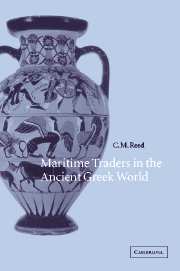Book contents
- Frontmatter
- Contents
- Acknowledgments
- List of abbreviations
- List of references to Greek terms
- Maps
- Introduction
- Chapter 1 Coming to terms
- Chapter 2 Classical modes and patterns of exchange
- Chapter 3 The juridical place of maritime traders
- Chapter 4 The level of wealth of maritime traders
- Chapter 5 Official attitudes towards maritime traders
- Chapter 6 Unofficial attitudes toward maritime traders
- Chapter 7 Archaic modes of exchange and the personnel involved c. 800–475 b.c.
- Chapter 8 Conclusion: then and now
- Appendix 1 Emporoi and nauklēroi: their attested states of origin
- Appendix 2 Cohesion among maritime traders
- Appendix 3 The dikai emporikai
- Appendix 4 Catalogue of emporoi and nauklēroi
- Bibliography
- Index locorum
- General index
Appendix 2 - Cohesion among maritime traders
Published online by Cambridge University Press: 22 September 2009
- Frontmatter
- Contents
- Acknowledgments
- List of abbreviations
- List of references to Greek terms
- Maps
- Introduction
- Chapter 1 Coming to terms
- Chapter 2 Classical modes and patterns of exchange
- Chapter 3 The juridical place of maritime traders
- Chapter 4 The level of wealth of maritime traders
- Chapter 5 Official attitudes towards maritime traders
- Chapter 6 Unofficial attitudes toward maritime traders
- Chapter 7 Archaic modes of exchange and the personnel involved c. 800–475 b.c.
- Chapter 8 Conclusion: then and now
- Appendix 1 Emporoi and nauklēroi: their attested states of origin
- Appendix 2 Cohesion among maritime traders
- Appendix 3 The dikai emporikai
- Appendix 4 Catalogue of emporoi and nauklēroi
- Bibliography
- Index locorum
- General index
Summary
To what extent if at all did maritime traders share a common policy or a sense of unity? And, if any cohesion did exist, of what sort was it – political, economic, religious, national, or a combination of some of these?
Any sort of political cohesion is very unlikely. Chapter 3 is devoted to showing that those trading at Athens were largely non-citizens and therefore without access to the political machinery.
Not a single man known to have been politically prominent in fifth/fourth century Athens ever appears as a merchant (except Andocides, when in exile), and … not a single known merchant is found playing any part in politics.
Paul McKechnie therefore (1989: 197 n.62) misses the point when he emphasizes “the influence of traders and ship captains on getting decrees passed at Athens.” Not only were non-citizen traders unable to exert political influence as an outside “pressure group” – a notion implying institutional arrangements that did not exist; more significantly, they did not need to form a pressure group. In [Lys.] 22.21 an Athenian jury is urged to “court and render more zealous” the (obviously) foreign emporoi. This is not because the emporoi confront Athens as a unified group with a common political or economic policy; Athens' interest in traders can be explained instead by the single, all-sufficient reason Seager (1966: 184) offers: “if nobody brought corn to the Piraeus, Athens would starve.”
- Type
- Chapter
- Information
- Maritime Traders in the Ancient Greek World , pp. 85 - 88Publisher: Cambridge University PressPrint publication year: 2003



